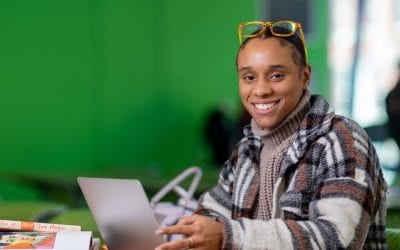Governing for the People with Mayor Lori E. Lightfoot
American Dream Reconsidered ConferenceWith an audience of hundreds of live viewers, Chicago Mayor Lori E. Lightfoot spoke about leading the city through the most difficult challenges of our lifetimes.
The American Dream Reconsidered event was moderated by the Honorable Claire Ann Williams, retired Seventh Circuit U.S. Court of Appeals Judge. Williams is no stranger to the conference, and in previous years hosted standing-room-only conversations with Supreme Court Justice Ruth Bader Ginsburg and Attorney General Eric Holder.
“This conference is special because it examines the American dream from different aspects, keeping it alive,” she said.
During the 45-minute conversation, Williams asked Mayor Lightfoot how her early influencers and leadership experiences shaped her current perspective. Despite her early academic success, Lightfoot says that in college she became more afraid of taking risks.
“When you’re in your late teens and 20s, that’s a time to take risks, to really push yourself and find out a lot about who you are and what you’re made of.”

In 2019, Lightfoot became the first Black woman and openly gay person to be elected mayor in Chicago. One of her main agenda items is the War on Poverty. Lightfoot explained her perspective on creating Black wealth and challenging the economic disparities at the root of many other inequalities.
“Poverty is not cost free,” Lightfoot said. “We pay for our neglect. It shows up in emergency rooms, it shows up in early deaths, it shows up in the amount of social services interventions that we have to inject into communities.”
The conversation turned to the pressing danger of the pandemic and the role the city has assumed in the absence of federal leadership. “The pandemic has showed our strengths, but also our profound vulnerabilities,” Williams said as they looked at COVID-19’s devastating impact on African Americans. “I think it just ripped the Band-Aid right off it.”
Lightfoot discussed how their recovery plan encompassed mental health, trauma, economic impact on micro and small businesses, and community organizations. Each morning, the mayor begins her day with a call from public health officials on the latest counts of new cases, a clear reminder that the pandemic is not in the past.
“None of the decisions we’ve had to make during COVID-19 had been easy,” Lightfoot said.
Williams fielded several student questions about face mask policies, Lightfoot’s new role as “meme queen” and the impact of COVID-19 on tourism. The weighty conversation turned to the murder of George Floyd, and the ongoing national movement on behalf of all Black victims of police violence.
Lightfoot said that the current public reckoning has its roots in the “original sin of slavery,” its consequences metastasizing into systemic racism, segregation and poverty. “We have to challenge ourselves to do much more, and look at this moment as a real opportunity,” she said.
Williams and the mayor discussed her plan for police reform, from increasing diversity in hiring to a commitment to civilian oversight and police licensing. “A healthy, respectful partnership with the community is [a police officer’s] most important tool,” she said. “Not a gun. Not a badge.”
The conversation closed as Lightfoot urged listeners — especially young voters — to register, to have a plan for voting, and to help others in their networks to cast their ballot.
“Every vote matters, up and down the ballot,” Lightfoot said. “Our democracy is on the ballot November 3. Don’t waste the opportunity to put your mark down on where you stand on the important issues of the day.”
The American Dream Reconsidered is a free conference that invites scholars, activists and leaders to explore the modern American dream. Sessions delve into immigration, health care, politics and more in America today. With optimism and hope, our panelists share visions for the future of our democracy.
More in this section
Personifying DEI through determination and an open heart
If you want something done, give it to a busy person. That adage easily applies to Lyvette Medina Jones and her ability to juggle work and family with volunteering in her community.
A big change in tuition is brewing for the incoming class of 2023
A recent study by University of Chicago National Opinion Research Center revealed that Americans see the cost of education as the No. 1 barrier to completing a degree or beginning college.
A philosophical approach
In fall 2012, Roosevelt University’s Wabash Building opened — making history as the second tallest academic facility in the United States.



